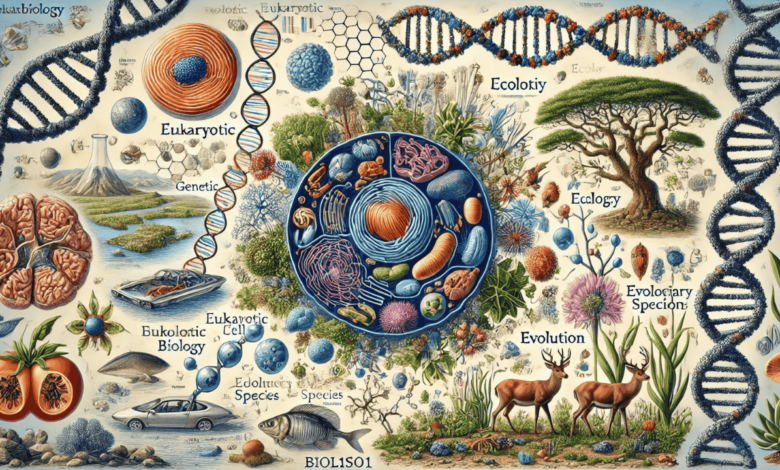BIOL1S01: Building a Strong Foundation in Biological Sciences

The course BIOL1S01 serves as a foundational gateway into biological sciences, offering students a deep dive into fundamental concepts underpinning the field. A Foundation in Science lays the groundwork for pursuing science-related degrees, and this introductory course provides the necessary skills and knowledge for those pursuing a career in biology, medicine, or environmental sciences. From cellular biology to genetics and ecological systems, this introductory course provides the necessary skills and knowledge for those pursuing a career in biology, medicine, or environmental sciences. Whether preparing for advanced studies or seeking a career in biology-related fields, BIOL1S01 equips you with essential competencies. In this post, we shall discuss the critical elements of BIOL1S01, including the course structure, core concepts, study tips, and its relevance to further studies and professional applications.
Overview of BIOL1S01
BIOL1S01 is an entry-level biology course designed to cover various fundamental biological principles. Students gain exposure to the structure and function of cells, genetics, ecological interactions, and evolutionary theory. This course is typically required for biology majors and can also serve as a general education science credit for non-majors.
Key Areas Covered:
- Cell Biology: Understanding the structure and functionality of cells, including cellular metabolism, energy production, and communication between cells.
- Genetics: Basics of heredity, DNA structure, gene expression, and how traits are passed from one generation to the next.
- Ecology: Study of ecosystems, energy flow, and the interdependence of organisms within their environments.
- Evolution: Examination of natural selection, genetic drift, and the adaptation of organisms over time.
This course is crucial for setting the stage for more advanced topics such as biochemistry, microbiology, and environmental biology.
Core Concepts and Learning Objectives
The course structure of BIOL1S01 revolves around the following primary concepts, each contributing to the broader understanding of biological systems:
- Cell Structure and Function: Students learn about the different types of cells—prokaryotic and eukaryotic—and their unique features. The roles of the nucleus, mitochondria, and ribosomes are explored in-depth.
- Energy Flow and Metabolism: Cellular respiration and photosynthesis are studied to understand how organisms obtain and use energy. This section also includes enzyme function and metabolic pathways.
- Genetic Mechanisms: From DNA replication to the central dogma of molecular biology (DNA -> RNA -> Protein), students gain insight into how genetic information is encoded, expressed, and passed on.
- Evolutionary Biology: This course explores how populations evolve through mutation, selection, and genetic drift. Evolution is the central theory connecting all areas of biology.
- Ecological Principles: In the ecology component, students study how organisms interact with each other and their environments. This includes learning about food chains, nutrient cycles, and population dynamics.
By the end of BIOL1S01, students are expected to grasp the fundamentals of these topics, setting the groundwork for more specialized courses.
Tips for Excelling in BIOL1S01
To succeed in BIOL1S01, it is essential to approach the material strategically and actively engage with course resources. Here are several study tips:
Create a Study Schedule
Given the breadth of content, staying organized and keeping up with readings and assignments is essential. A steady study regimen can help you manage your time more successfully.
Utilize Visual Learning
Biology is a visual subject with complex processes and structures best understood through diagrams and flowcharts. Consider using visual aids to complement your notes.
Engage in Active Learning
Participate in class discussions, ask questions, and join study groups. Engaging with the material in multiple ways improves retention and understanding.
Leverage Available Resource
Beyond textbooks, use online resources like scientific journals, videos, and interactive simulations to enhance your understanding of complex topics. Universities often provide access to scholarly databases for deeper exploration.
Maximize Lab Experiences
If the course includes laboratory work, practice techniques, and full engagement in experiments, Lab work reinforces theoretical concepts and gives practical experience.
Importance of Fieldwork and Practical Applications
BIOL1S01 is not limited to textbook learning; many versions of this course incorporate practical experiences such as lab work and field trips. Fieldwork, in particular, offers students an opportunity to apply their theoretical knowledge to real-world ecosystems.
Fieldwork Examples:
- Ecosystem Surveys: Students might conduct studies of local ecosystems, assessing plant and animal populations and their interactions.
- Environmental Impact Studies: Learning how human activities affect biodiversity, climate, and ecosystems is integral to understanding biological sciences.
Fieldwork allows students to witness ecological concepts and deepens their appreciation for biodiversity and conservation efforts.
Relevance of BIOL1S01 to Advanced Studies and Career Pathways
BIOL1S01 is a prerequisite for many advanced biology courses, making it a critical step for those pursuing careers in biological research, healthcare, or environmental sciences. Here’s how the course supports these pathways:
- Advanced Studies: Students interested in molecular biology, genetics, or biochemistry will find that the foundational knowledge from BIOL1S01 prepares them for more specialized subjects like microbiology, molecular genetics, and physiology.
- Professional Development: For those pursuing careers in science, BIOL1S01 provides essential skills in scientific reasoning, data analysis, and communication. These skills are vital for medical research, environmental conservation, and biotechnology professions.
- Interdisciplinary Applications: Knowledge of biology is increasingly important in fields like agriculture, environmental policy, and public health. Understanding how biological systems function and interact is crucial for solving global challenges such as climate change, food security, and disease management.
Challenges and How to Overcome Them
Like any rigorous science course, BIOL1S01 comes with its challenges. The broad scope of topics can overwhelm students unfamiliar with scientific terminology or laboratory procedures. Additionally, some students may struggle with applying theoretical knowledge to practical scenarios.
Solutions:
- Focus on Conceptual Understanding: Rather than memorizing facts, understand core concepts and how they interconnect. This method will improve your ability to retain knowledge.
- Seek Help Early: If you’re struggling, seek assistance from instructors, teaching assistants, or peer tutors. Most universities offer tutoring services, and study groups can be immensely beneficial.
- Practice Critical Thinking: Many biology questions require the application of knowledge rather than rote memorization. Practice critical thinking and problem-solving by completing exercises and lab experiments regularly.
Conclusion
BIOL1S01 offers students an invaluable introduction to the vast field of biology. Through a comprehensive exploration of cell biology, genetics, evolution, and ecology, students gain essential knowledge and skills to support their academic and professional pursuits. Whether you aim to become a doctor, a researcher, or an environmental scientist, excelling in BIOL1S01 will set you on the path to success.
FAQs for BIL1S01
What is BIOL1S01?
BIOL1S01 is an introductory biology course that covers fundamental concepts such as cell biology, genetics, evolution, and ecology. It provides students with a foundational understanding of biological sciences, preparing them for advanced courses and careers in related fields.
Who should take BIOL1S01?
BIOL1S01 is typically required for biology majors and is also suitable for non-majors fulfilling a general education science requirement. It is ideal for students interested in biological sciences, healthcare, environmental studies, or related disciplines.
What are the prerequisites for BIOL1S01?
While prerequisites may vary by institution, many universities recommend high school-level biology and chemistry to ensure a smooth transition into the course content. Some universities might require basic science credits as a prerequisite.
Does BIOL1S01 include laboratory work?
Yes, many versions of BIOL1S01 include lab components where students gain hands-on experience in biological experiments. These lab sessions help reinforce theoretical concepts and offer practical insights into biological processes.
What study materials are recommended for BIOL1S01?
In addition to the course textbook, supplementary materials such as scientific journals, online simulations, and interactive biology platforms can enhance understanding. Utilizing study groups and academic resources like tutoring services can also be beneficial.
You May Also Read: Empowering Reintegration: Delta Sigma Theta Returning Citizen Event 2024




